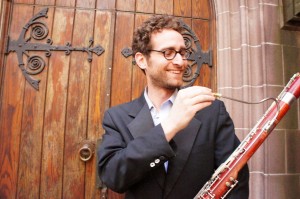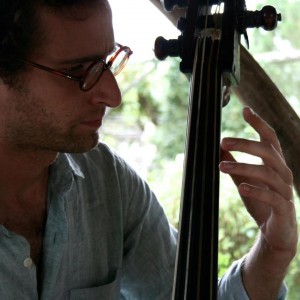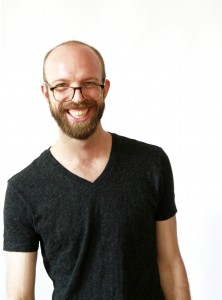The Oracle Hysterical
BRAD BALLIETT
WSW: When did you start composing?
BB: I started composing when I was about eight or nine – I would sit at my grandfather’s piano and write down A-minor chords over and over. I thought it was the deepest thing anyone had ever done. My first premiere was written for the clarinet section of the fifth-grade band.
WSW: Do you play an instrument or sing?
BB: I’m a bassoonist, I’d say as much or more as being a composer. I love playing new music with groups like Metropolis, Signal, Either/Or and ICE, and I was recently appointed principal bassoon of the Princeton Symphony. Come check out a show!
WSW: Where do you usually compose?
BB: I’m often busy playing concerts, so I write wherever I can – at home, backstage, even sometimes on the subway.
WSW: What has been your biggest challenge in composing?
BB: Finding a balance between performing and composing — both areas of my life seem to demand complete and undivided attention, but I love both too much to relent on either side.
WSW: Which composer do you admire?
BB: I’ve been really into the music of Pascal Dusapin recently — he has a way of making his music sound fresh and relevant, but still unmistakably his and inimitably listenable. I also respect Marek Poliks and my fellow bandmates Doug Balliett and Elliot Cole for their commitment to their vision.
WSW: What do you do in your free time?
BB: I like to run and read old books – both activities help me decide where to go next, artistically.
WSW: Can you tell us a little about The Fisherman and His Wife?
BB: Doug, Elliot and I got really deep into the Grimm’s Household Tales — we were featured as Spotlight Artists in composition at the Lucerne Festival Academy, and one of our projects was an evening of pieces telling these stories. Doug wrote the words to this piece, Elliot wrote the music, and I orchestrated the music for wind quintet — a real collaboration.
WSW: What do you want the audience to know about your piece?
BB: That it’s about a half-hour, so they should sit back, relax, and enjoy the story.
WSW: When did you start composing?
DB: I was making up songs from a very young age, and started writing things down around the age of 10, for whatever instrument was around at the time. However, I didn’t really start writing the music in my own voice until the end of my undergraduate years.
WSW: Do you play an instrument or sing?
DB: I play a lot of bassy instruments–bass, viola da gamba, violone, guitar, and a smattering of piano.
WSW: Where do you usually compose?
DB: I like to work at a piano, although I find the subway is a nice place to write melodies. I love writing texts in public libraries.
WSW: What has been your biggest challenge in composing?
DB: There are so many different strands of composition, I think the hardest thing is writing with a unique voice without identifying as, say, a “minimalist” or a “serialist”. When people ask me what kind of music I write, I find it hard to answer briefly. I write what I want to hear, and though it uses elements from many traditions, I like to think that it is both new and representative of myself.
WSW: Which composer do you admire?
DB: I love the way Mahler balanced his life as an interpreter and a composer, and he’s probably my favorite composer. I envy those who can spin out one texture really engagingly for long stretches, like Part, Feldman or Nyman.
WSW: What do you do in your free time?
DB: Running, long walks, new music, lots of books, Frasier, and as much socializing as possible!
WSW: Can you tell us a little about The Fisherman and His Wife?
DB: It’s such a great story that really lends itself to a kind of narrative rap setting. There are corners of the story that are infinitely explorable–each time the fisherman returns to his new and grander home, there are a million little things to notice. I knew I wanted to make some sort of Grimm rap narrative, and this seemed to present a lot of opportunity to flex my imagination. I started writing it not really knowing what it would be. When I read it to Elliot, he thought he could do a good job setting it for string quartet. He was right, and I was honored! Brad made the arrangement for wind quintet, so skillfully you would suspect that was the original intention.
WSW: What do you want the audience to know about your piece?
DB: We have thousands more like it. start at oraclehysterical.com.
WSW: When did you start composing?
EC: I’m from a place (Austin, TX) where a certain image of cowboy-outlaw-singer-songwriter meant a lot, so as a teenager I wrote lots of songs. I didn’t put notes on paper, though, until the end of high school, when I started writing string parts for those songs. Then one summer I wrote and produced a musical with my friend René, and I was hooked.
WSW: Do you play an instrument or sing?
EC: I’m a singer first, but grew up playing piano and guitar and also know my way around a trumpet.
WSW: Where do you usually compose?
EC: I have a desk, keyboard and little home studio set-up in my apartment in Newark. That’s where most of it happens, although I also often work on the train.
WSW: What has been your biggest challenge in composing?
EC: My biggest challenge is myself – every time I write a piece, I try to do something with it that I’ve never done before. I’ll tackle a style that doesn’t exist, or a new set of tools. I don’t let myself off easy.
WSW: Which composer do you admire?
EC: Monteverdi! I’ve been getting to know Poppea lately at the keyboard, and am finding so much imagination to appreciate.
WSW: What do you do in your free time?
EC: I cook a lot, and also love to take walks where I get kind of lost – luxurious!
WSW: Can you tell us a little about The Fisherman and His Wife?
EC: We’ve been exploring the space between classical music and hip-hop for years; this piece is just one more attempt to find a balance. We wanted to make something fun and funny, with richly interconnected musical themes.








